Tindak Pidana Pencurian Jaringan Wifi Menurut Pasal 30 Undang-Undang Nomor 19 Tahun 2016 Tentang Informasi dan Transaksi Elektronik
DOI:
https://doi.org/10.22373/justisia.v6i1.10611Abstract
This research is motivated by the number of internet (Wi-Fi) stealing around Syiah Kuala Sub District, Banda Aceh, in which this action can disserve the owner of the internet and against to the law. The method of this research is qualitative in which it describes the result of research objectively to conditions encountered in the gorund. The research problems are how the Wi-Fi internet is theft (modus operandi) and what are juridical consequences of the act according to Article 30 of Law No. 19/2016 concerning Electronic Information and Transactions, and how is the Islamic law perspective on the act of internet stealing. The result showed that the modus operandi of Wi-Fi internet stealing is by using a laptop or mobile phone and downloading certain software or applications they need to break through the security system and obtain a username and password. Theft or internet (Wi-Fi) stealing in Syiah Kuala District, Banda Aceh City, can be punished under Article 30 paragraph (1), (2) and (3) in conjunction with Article 46 paragraph (1), (2) and (3) Law No. 19/2016 concerning Electronic Information and Transactions. The action categorized as illegal access. The theft of the Wi-Fi internet in Islamic law perspective is clearly prohibited (haram) due to someone has used other people property without permission. So, it is expected that the perpetrators or other people in order not to do the actin because it is against to the law, and also expected the Wi-Fi owner could report the case to the police.References
Abī Al-Ḥusain Muslim bin Al-Nasaburi, Ṣaḥīḥ Muslim, (Beirut: Dār al-Fikr, 2011).
A. Djazuli, Ilmu Fiqh, Penggalian, Perkembangan dan Penerapan Hukum Islam, (Jakarta: Prenada Media, 2005).
______, Fiqh Jinayah, (Jakarta: Raja Grafindo Persada, 2000).
______, Kaidah-Kaidah Fikih, (Jakarta: Kencana, 2006).
Dep. Agama RI, Al-Quran dan Terjemahannya, (Bandung: Sygma Examedia Arkaleema, 2007).
Hikmah Fajar Assidiq, Kupas Tuntas Wifi, (Surabaya: Surya University,2013).
Maskun, Kejahatan Siber Cyber Crime, (Jakarta: Prenada Media Group, 2013)
M. Ali Zaidan, Kebijakan Kriminal, (Sinar Grafika: Jakarta, 2016).
Niniek Suparni, CYBERSPACE Problematika & Antisipasi Pengaturannya, (Jakarta: Sinar Grafika, 2009).
Quthb, Sayyid, Tafsir Fi Zhilalil-Qur’an di bawah naungan Al-Qur’an, (Jakarta: Gema Insani, 2001).
Rachel Boba, Crime Analysis and Crime Mapping, (USA: Sage Publication, 2005).
R. Soesilo, Kitab Undang-Undang Hukum Acara Pidana, (Bogor: Politea, 1996).
Shihab, M. Quraish, Tafsir Al-Misbah, (Jakarta: Lentera Hati,2002).
Sutan Remy Syahdeini, Kejahatan & Tindak Pidana Komputer, (Jakarta: Pustaka Utama Grafiti, 2009).
Undang-Undang Republik Indonesia Nomor 19 Tahun 2016 tentang Informasi dan Transaksi Elektronik.
SUMBER LAIN
Id.wikipedia.org, Modus Operandi, https://id.wikipedia.org/wiki/Modus_operandi, diakses pada tanggal, 19 Juli 2020.
Vandana Wekhande, Wi-Fi Technology: Security Issues, Rivier Academic Journal (2006) hlm 1, https://www.rivier.edu/journal/RCOAJ-Fall-2006/J62-Wekhande.pdf, diakses 9 Febuari 2018.
Downloads
Published
Issue
Section
License
The Authors submitting a manuscript do so on the understanding that if accepted for publication, copyright of the article shall be assigned to Jurnal Justisia : Jurnal Ilmu Hukum, Perundang-undangan dan Pranata Sosial, Ar-Raniry State Islamic University, Indonesia as the publisher of the journal.
Jurnal Justisia : Jurnal Ilmu Hukum, Perundang-undangan dan Pranata Sosial right of first publication with the work simultaneously licensed under Creative Commons Attribution-ShareAlike 4.0 International License (CC BY-SA 4.0) that allows others to share (copy and redistribute the material in any medium or format) and adapt (remix, transform, and build upon the material) the work for any purpose, even commercially with an acknowledgment of the work's authorship and initial publication in Jurnal Justisia : Jurnal Ilmu Hukum, Perundang-undangan dan Pranata Sosial. Authors are able to enter into separate, additional contractual arrangements for the non-exclusive distribution of the journal's published version of the work (e.g., post it to an institutional repository or publish it in a book), with an acknowledgment of its initial publication in Jurnal Justisia : Jurnal Ilmu Hukum, Perundang-undangan dan Pranata Sosial. Authors are permitted and encouraged to post their work online (e.g., in institutional repositories or on their website) prior to and during the submission process, as it can lead to productive exchanges, as well as earlier and greater citation of published work (See The Effect of Open Access).

